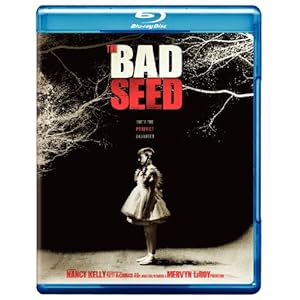

The Bad Seed would seem to be the dark drama that launched a genre of evil-kid movies. Novelist William March definitely struck archetypal gold when he conceived eight-year-old Rhoda Penmar, a budding sociopath with the internal drive to get what she wants the easy way: by threatening and ultimately killing anyone who stands in her path. Rhoda is, of course, something of a caricature, made all the more creepy by her insistently pure appearance: in her clean, blonde pigtails and neatly appointed outfits, she's like a living doll.
But The Bad Seed wouldn't work as well as it does if it were total fantasy. U.S. Department of Justice statistics from 1996 tell us that one in five murders of children are committed by other children; though most of these killers are teenage, Rhoda is by no means unprecedented, and the genius of Maxwell Anderson's 1954 play adaptation (turned into a screenplay by John Lee Mahin) is its insistence on psychological theory. Director Mervyn LeRoy (Mister Roberts) did a fine job of transplanting the celebrated stageplay into a film that won four Academy Award nominations, one for Harold Rosson's black-and-white cinematography and three for the film's top female performers, all reprising their stage roles: Nancy Kelly as concerned mother Christine, Patty McCormack as little Rhoda, and Eileen Heckart as Mrs. Daigle, a neighboring mother sent into an alcoholic tailspin by grief.
The slow-burning narrative succeeds in turning the screw, as clues compound to suggest that Rhoda may be murderously ruthless (over a penmanship medal, of all things). As Kelly frets, the cheery affection neighbor and landlord Monica Breedlove (Evelyn Varden) shows for Rhoda only adds to a tense time in the Penmar household (father Col. Kenneth Penmar—played by Perry Mason's William Hopper—is out of town on military assignment), while nasty janitor LeRoy (the great Henry Jones, of Vertigo) creates his own brand of bad vibes by hating on Rhoda as much as Monica loves her. This can't end well, and indeed it won't, though the film's ending diverges from the novel and the play to satisfy Hollywood's restrictive moral code at the time (dictated by the censorial Hays Office).
While Kelly is good in an old-fashioned, Sirkian, stare-off-in-the-distance way appropriate to her consistently stunned and behaviorally paralyzed character, it's McCormack who's most responsible for selling the story and Heckart who dazzles with sheer acting power. McCormack gives a credibly creepy performance that never quite goes over the top, and Heckart simply blazes with emotional force: you feel her pain in a performance that's shockingly modern in feel. Ultimately, The Bad Seed is a gimmicky story, coming down on a dubious side of the nature-versus-nurture argument, but it's also good rainy-day fun and, I guess you'd say, the start of something bad in horror cinema: the first bad-seed movie will probably always be the best.

|
|
 |
Warner gives The Bad Seed its Blu-ray debut in a special edition featuring a 1.78:1 transfer. Since the previous DVD was presented in a 1.37:1 aspect ratio, this may be cause for some confusion, but the film was originally exhibited in a matted widescreen format like the one seen on the Blu-ray. If there's a problem with the Blu-ray, it's in the lack of fine detail: the black-and-white image is naturally film-like, but definitely on the soft side, with contrast that wavers. Some images appear crisper than others, but the transfer excels more in the area of cleanliness: the source is spotless. The lossless DTS-HD Master Audio 1.0 track is as good, meaning as clear and clean and full-sounding, as it's likely to get for this film.
Bonus features ported over from DVD include an enjoyable commentary by star Patty McCormack and Bad Seed super-fan Charles Busch (star and writer of Die, Mommie, Die!), the lovely interview featurette "Enfant Terrible: A Conversation with Patty McCormack" (15:10, SD), and the film's "Theatrical Trailer" (3:20, SD). Fans of the film will no doubt want to upgrade for the widescreen transfer, even though it's not quite as detailed as one might hope.
 |